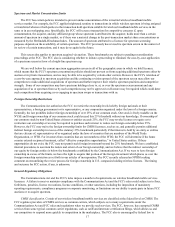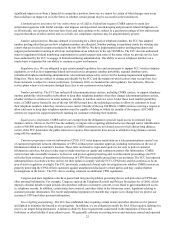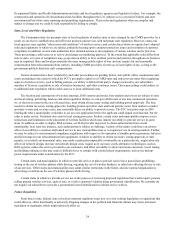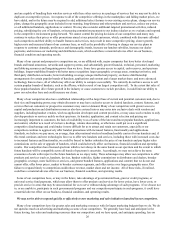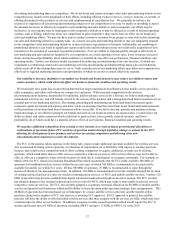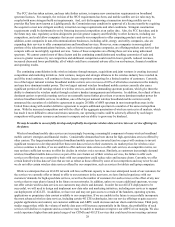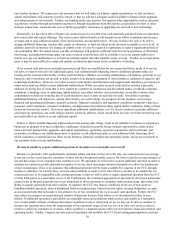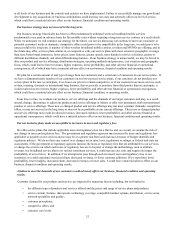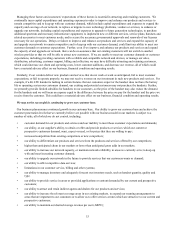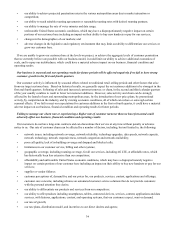Metro PCS 2011 Annual Report Download - page 35
Download and view the complete annual report
Please find page 35 of the 2011 Metro PCS annual report below. You can navigate through the pages in the report by either clicking on the pages listed below, or by using the keyword search tool below to find specific information within the annual report.24
Occupational Safety and Health Administration and state and local regulatory agencies and legislative bodies. For example, the
construction and operation of telecommunications facilities throughout the U.S. subjects us to a myriad of federal and state
environmental laws that create reporting and permitting requirements. These rules and regulations often are complex and
subject to change and we could be held responsible for failing to comply.
State, Local and Other Regulation
The Communications Act preempts state or local regulation of market entry or rates charged by any CMRS provider. As a
result, we are free to establish rates and offer new products and services with minimum state regulation. However, states and
local agencies may regulate “other terms and conditions” of wireless service, and certain states where we operate have adopted
rules and regulations to which we are subject, primarily focusing upon consumer protection issues and resolution of customer
complaints. In addition, several state authorities have initiated actions or investigations of various wireless carrier practices.
These proceedings could cause us to review and change our marketing practices. To the extent that applicable rules differ from
state to state, our costs of compliance may go up and our ability to have uniform policies and practices throughout our business
may be impaired. State and local governments also may manage public rights of way and can require fair and reasonable
compensation from telecommunications carriers, including CMRS providers, for the use of such rights of any, so long as the
government publicly discloses such compensation.
Various decisions have been rendered by, and other proceedings are pending before, state public utility commissions and
courts pertaining to the extent to which the FCC's preemptive rights over CMRS rates and entry prevent states from regulating
aspects of wireless service, such as billing policies, our ability to bill for third party's charges incurred by our subscribers,
transfers of licenses, acquisition or sale of wireless businesses, and other consumer issues. These proceedings could subject us
to additional state regulation which could cause us to incur additional costs.
The location and construction of wireless antennas, DAS systems and nodes, base stations and towers are subject to state
and local zoning, permitting, land use and other regulation. Before we can put a DAS node or site into commercial operation,
we, or the tower owner in the case of leased sites, must obtain all necessary zoning and building permit approvals. The time
needed to obtain necessary zoning approvals, building permits and other state and local permits varies from market to market
and state to state and, in some cases, may materially delay our ability to provide service. The FCC issued an order in 2010
limiting the time a municipality could take to act on a site application before the applicant could appeal such inaction, but the
order is under review. Variations also exist in local zoning processes. Further, certain cities and municipalities impose severe
restrictions and limitations on the placement of wireless facilities which may impede our ability to provide service in some
areas. In addition, in order to deploy DAS systems, our DAS provider may need to obtain authorization from a local
municipality. In at least one instance, such authorization is subject to challenge. Actions of this nature could have an adverse
effect on our ability to construct and launch service in new metropolitan areas or to expand service in existing markets. Further,
we may be subject to environmental compliance regulations with respect to the operation of standby power generators, batteries
and fuel storage for our telecommunications equipment. A failure or inability to obtain necessary zoning approvals or state
permits, or to satisfy environmental rules, may make construction impossible or infeasible on a particular site, might adversely
affect our network design, increase our network design costs, require us to use more costly alternative technologies, such as
DAS systems, reduce the service provided to our customers, and affect our ability to attract and retain customers. Local zoning
and building ordinances also may make it difficult for us to comply with certain federal requirements, such as the backup
power requirements under consideration by the FCC.
Certain states and municipalities in which we provide service or plan to provide service have passed laws prohibiting
texting or the use of wireless phones while driving, requiring the use of wireless headsets, or other laws affecting the use or sale
of our services. Other states and municipalities may adopt similar restrictions in the future, and one national organization is
advocating a total ban on the use of wireless phones while driving.
Certain states in which we provide service are in the process of reviewing proposed legislation that would require persons
selling prepaid wireless services, such as ours, to verify a customer's identity using government identification. We currently do
not require our subscribers to provide a government issued identification to initiate service with us.
Future Regulation
From time to time, federal, state or local government regulators enact new or revise existing legislation or regulations that
could affect us, either beneficially or adversely. Ongoing changes in the political and financial climate may foster increased
legislation or regulation, which might adversely affect us.





